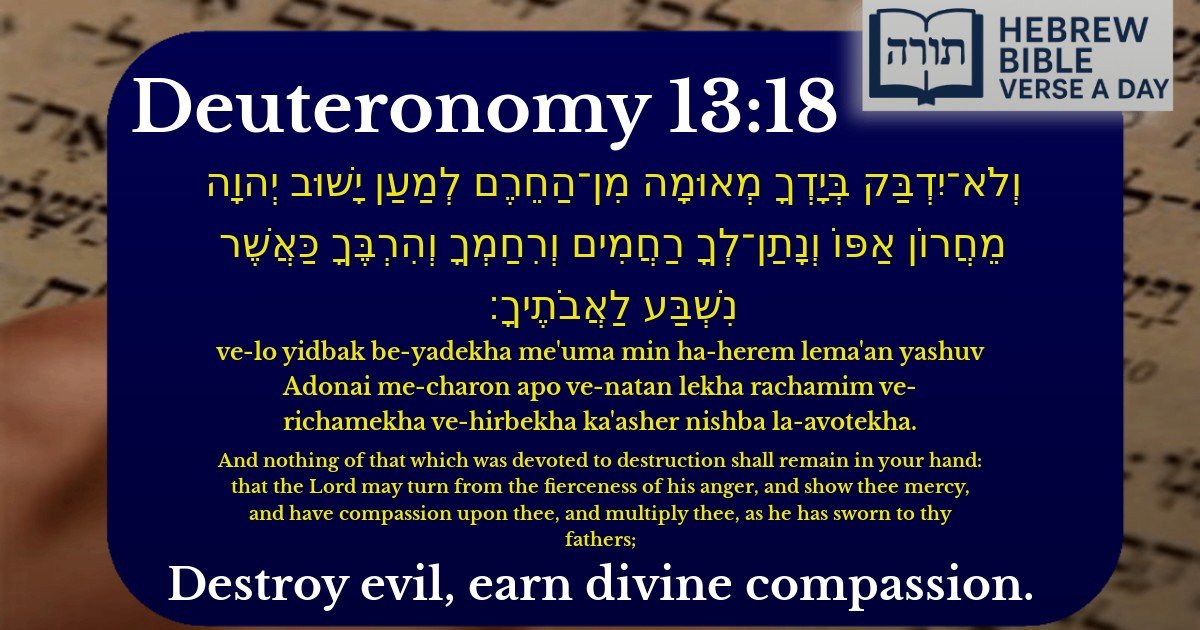Join Our Newsletter To Be Informed When New Videos Are Posted
Join the thousands of fellow Studends who rely on our videos to learn how to read the bible in Hebrew for free!
Hebrew Text
וְלֹא־יִדְבַּק בְּיָדְךָ מְאוּמָה מִן־הַחֵרֶם לְמַעַן יָשׁוּב יְהוָה מֵחֲרוֹן אַפּוֹ וְנָתַן־לְךָ רַחֲמִים וְרִחַמְךָ וְהִרְבֶּךָ כַּאֲשֶׁר נִשְׁבַּע לַאֲבֹתֶיךָ׃
English Translation
And nothing of that which was devoted to destruction shall remain in your hand: that the Lord may turn from the fierceness of his anger, and show thee mercy, and have compassion upon thee, and multiply thee, as he has sworn to thy fathers;
Transliteration
Ve-lo yidbak be-yadekha me'uma min ha-herem lema'an yashuv Adonai me-charon apo ve-natan lekha rachamim ve-richamekha ve-hirbekha ka'asher nishba la-avotekha.
Hebrew Leining Text
וְלֹֽא־יִדְבַּ֧ק בְּיָדְךָ֛ מְא֖וּמָה מִן־הַחֵ֑רֶם לְמַ֩עַן֩ יָשׁ֨וּב יְהֹוָ֜ה מֵחֲר֣וֹן אַפּ֗וֹ וְנָֽתַן־לְךָ֤ רַחֲמִים֙ וְרִֽחַמְךָ֣ וְהִרְבֶּ֔ךָ כַּאֲשֶׁ֥ר נִשְׁבַּ֖ע לַאֲבֹתֶֽיךָ׃
וְלֹֽא־יִדְבַּ֧ק בְּיָדְךָ֛ מְא֖וּמָה מִן־הַחֵ֑רֶם לְמַ֩עַן֩ יָשׁ֨וּב יְהֹוָ֜ה מֵחֲר֣וֹן אַפּ֗וֹ וְנָֽתַן־לְךָ֤ רַחֲמִים֙ וְרִֽחַמְךָ֣ וְהִרְבֶּ֔ךָ כַּאֲשֶׁ֥ר נִשְׁבַּ֖ע לַאֲבֹתֶֽיךָ׃
🎵 Listen to leining
Parasha Commentary
📚 Talmud Citations
This verse is not quoted in the Talmud.


Understanding the Prohibition of Taking from the Herem
The verse (Devarim 13:18) commands the Israelites not to take anything from the cherem (that which is devoted to destruction) for personal benefit. Rashi explains that this prohibition ensures that no trace of idolatry or its spoils remain among the Jewish people, as taking such items could lead to spiritual contamination. The Rambam (Hilchot Avodat Kochavim 7:1-2) elaborates that the cherem must be utterly destroyed to eradicate any influence of idolatry, reinforcing the severity of this commandment.
The Connection to Divine Mercy
The verse links abstaining from the cherem to Hashem's mercy: "that the Lord may turn from the fierceness of His anger." The Sforno teaches that distancing oneself from the spoils of idolatry demonstrates complete rejection of evil, thereby invoking divine compassion. The Talmud (Sanhedrin 43b) similarly states that avoiding any association with forbidden items brings atonement and appeases divine wrath.
Divine Promise of Multiplication
The conclusion of the verse—"and multiply thee, as He has sworn to thy fathers"—highlights the covenantal relationship. The Midrash (Devarim Rabbah 4:3) connects this to Avraham Avinu’s merit, emphasizing that adherence to Hashem’s commandments ensures the fulfillment of His oath to the patriarchs. The Ramban adds that this multiplication is both physical (numerous descendants) and spiritual (growth in Torah and mitzvot).
Practical Lessons from the Verse